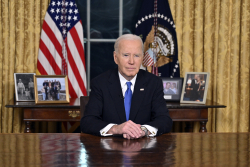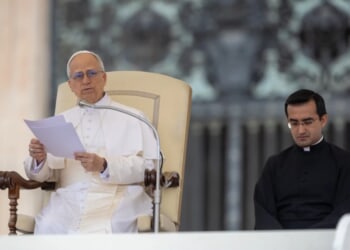Those who had been scattered by the persecution . . . went as far as Phoenicia, Cyprus, and Antioch, preaching the word to no one but Jews. (Acts 11:19)
St. Pope John Paul II’s pontificate was heavily shaped by the childhood circumstances in which he grew up. Out of all the circumstances he lived through, perhaps there were two that had the greatest overarching influence in his life. The first was the loss of his family: his sister died in infancy; his mother when he was nine, his beloved older brother when he was twelve, and finally, his father when he was twenty-one. Having lost his entire family had perhaps the single most profound impact on his relationship with Jesus and Mary. The Holy Family became his family now, in every sense of the word.
But there was a second circumstance of the pontiff’s childhood that also had an enormous influence on his pontificate: the community in which he lived. Although there was no shortage of anti-Jewish sentiment in Poland at the time, the future pope had numerous Jewish friends with whom he frequently played football. His first serious relationship was with a girl named Ginka Beer, described as “a Jewish beauty.” It was his friendship and camaraderie with a group of peers whom he cared for, and his witness of the ensuing mass horror inflicted upon their people, that no doubt shaped his singularity of purpose to make ecumenism and interfaith relations, as outlined by the Second Vatican Council, one of the chief priorities of his pontificate.
As a result, John Paul II became the most well-traveled pope in history. Of this, he said, “From the beginning of my pontificate I have chosen to travel to the ends of the earth in order to show this missionary concern. My direct contact with peoples who do not know Christ has convinced me even more of the urgency of missionary activity.”
There were some Cypriots and Cyrenians among them, however, who came to Antioch and began to speak to the Greeks as well . . . (Acts 11:20)
Just as John Paul II’s bold pontificate was shaped by his past experiences, so too would there have been something that shaped the decision of the Cypriots and Cyrenians of the early Christian community to reach out to the Greeks, when no one else would. What influences did they have in their lives that were so profound, that they felt compelled to break from their community’s stereotypes, prejudices, and anti-Gentile sentiments—evangelizing and ministering to those outside their community, despite the judgments that came from those within? Scripture does not reveal this to us. But we can certainly imagine that when these Cypriots and Cyrenians first began preaching to the Greeks, not everyone in Antioch who had been scattered from Jerusalem would have been supportive. There may even have been among them the underpinnings of debate, argument, division. After all, these Cypriots and Cyrenians were trying something new. Under whose authority did they receive permission to preach to anyone but the Jews? It is true, Peter was having his own epiphany regarding the Gentiles, but that was in Caesarea; news of those happenings was unlikely to have yet spread so fast and so far. So these men from Cyprus and Cyrene did not as yet have his example to follow. What prompted them to be so radical and so bold?
The hand of the Lord was with them. (Acts 11:21)
Friends, when the hand of the Lord is with us, nothing can get in the way. Nothing can stop our singularity of purpose to carry out His will, regardless of the cost to ourselves. Now we must be careful here, because there is a difference between singularity of purpose in accomplishing the Lord’s will, and being a stubbornly closed to the possibility that the way we are thinking or doing things could be wrong. Singularity of purpose means that we are determined to do what the Lord asks of us at all times. We are totally detached from the outcome of our obedience to His will, but quite attached to following that will itself.
Before homeschooling my children, I was involved in several of my parish’s ministries and otherwise striving to live the life of a Christian as faithfully as I could. Why the Lord would want me any less involved at my parish is a mystery to me, but suffice it to say, if I became more involved at Church, I would have been less involved at home.
If we are to become people of singular purpose, we must be open to where the Lord leads, even if it requires a change in the comfort zone we always knew, one that may be different from the way we already thought was best. If not, we run the risk of running a ministry well past its expiration date, drawing no fruit from the work that was always vibrant before, or otherwise not recognizing the place where the Lord wills to use our time, talent, and treasure now. Let’s not beat a dead horse by closing ourselves to what the Lord is asking of us today.
It was in Antioch that the disciples were first called Christians. (Acts 11:26)
And thus, we see the reason the “hand of the Lord” was nudging those Cypriots and Cyrenians to reach out to the Greeks. It was time to face the fact that the community of believers could no longer see themselves as the same people as their ancestors, except for the one “small” difference of believing that Christ was the Messiah. That difference made all the difference. And so, thenceforth, they would no longer call themselves “Jews.” This was a new wineskin in which everyone would be welcome.
For the first time in salvation history, the religious movement that would save mankind would become the ecumenical movement known as “Christianity.”
Author’s Note: Excerpt from The Safe Haven: Scriptural Reflections for the Heart and Home (Season of Easter). To purchase, visit Amazon or The Catholic Company, where all other volumes currently in print are also available.
Photo by Joana Abreu on Unsplash
















